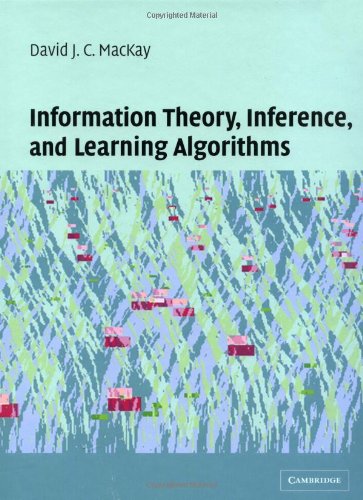Information Theory, Inference and Learning Algorithms
Are you looking for Information Theory, Inference and Learning Algorithms. It is a great product. Qualify to use it. After my friend bought it as a gift. We are happy to use it a lot. Information Theory, Inference and Learning Algorithms is more
expensive to buy Information Theory, Inference and Learning Algorithms. And the beauty of it is up to date. And the right size for use. Other than that the same type. My friend bought Information Theory, Inference and Learning Algorithms as a birthday gift.
After I got used to it. I am very impressed with the Information Theory, Inference and Learning Algorithms. This versatile. Simple and straightforward. And after that I got out of the other. Price is not expensive. Compared with the
features Information Theory, Inference and Learning Algorithms has. Information Theory, Inference and Learning Algorithms is a product that is extremely active. If you are looking for a product that looks similar. So I would recommend that you
use.Information Theory, Inference and Learning Algorithms

Information Theory, Inference and Learning Algorithms Overview
Information theory and inference, often taught separately, are here united in one entertaining textbook. These topics lie at the heart of many exciting areas of contemporary science and engineering - communication, signal processing, data mining, machine learning, pattern recognition, computational neuroscience, bioinformatics, and cryptography. This textbook introduces theory in tandem with applications. Information theory is taught alongside practical communication systems, such as arithmetic coding for data compression and sparse-graph codes for error-correction. A toolbox of inference techniques, including message-passing algorithms, Monte Carlo methods, and variational approximations, are developed alongside applications of these tools to clustering, convolutional codes, independent component analysis, and neural networks. The final part of the book describes the state of the art in error-correcting codes, including low-density parity-check codes, turbo codes, and digital fountain codes -- the twenty-first century standards for satellite communications, disk drives, and data broadcast. Richly illustrated, filled with worked examples and over 400 exercises, some with detailed solutions, David MacKay's groundbreaking book is ideal for self-learning and for undergraduate or graduate courses. Interludes on crosswords, evolution, and sex provide entertainment along the way. In sum, this is a textbook on information, communication, and coding for a new generation of students, and an unparalleled entry point into these subjects for professionals in areas as diverse as computational biology, financial engineering, and machine learning.

